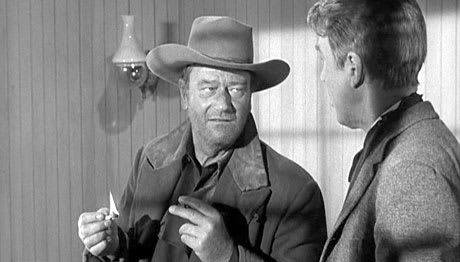John Ford's 1962 film, made near the end of his long career, is a product of a particularly strange juncture in the history of the Western. Cowboys still dominated television and movies but the stars and directors long associated with the genre were aging noticeably. Newer, more cynical variations of the form were on the way (most notably the spaghetti western cycle initiated by Sergio Leone's A Fistful Of Dollars, starring Clint Eastwood). Out of this transitional period emerged a group of films often labelled "twilight westerns," movies marked by a pronounced melancholia, and a sad nostalgia for the West that was. Examples include Sam Peckinpah's Ride The High Country, Lonely Are The Brave, with Kirk Douglas, and this film. Liberty Valance throws into opposition the civilizing forces represented by James Stewart, as a newly minted attorney determined to bring law and order to the anarchic west, represented by the town of Shinbone, and the rule of violence, incarnated by the eponymous villain (Lee Marvin, in a performance of palpable viciousness). Ambiguously situated between the two is the erstwhile Mt. Rushmore of actors, John Wayne, as the archetypal Western hero: fast with a gun, necessary to the taming of the West, but standing quite apart from the new order taming inevitably brings. The movie was poorly received at the time, with many critics complaining about the absence of the gorgeous Technicolor vistas widely associated with Ford. Today, with its stark black-and-white cinematography, cramped, stagy sets and iconic, long-dead leads clearly much too old for their parts (Stewart in particular), Liberty Valance seems a dark, affecting valediction, a farewell at once harsh and wistful to the mythical West Ford did so much to create. Those viewers unfamiliar with the classic Westerns associated with Ford and Wayne, like Stagecoach, probably shouldn't start with Liberty Valance. Those who are acquainted with the earlier films should be moved, and startled, by its moral and political complexity. The film's pristine transfer to DVD is complemented by a wealth of extras, including Peter Bogdanovich's informative, congenial commentary, audio snippets from interviews with Ford, Stewart and Marvin, a trailer and an excellent featurette.
(Paramount Pictures)The Man Who Shot Liberty Valance
John Ford

BY Mark CarpenterPublished May 28, 2009



